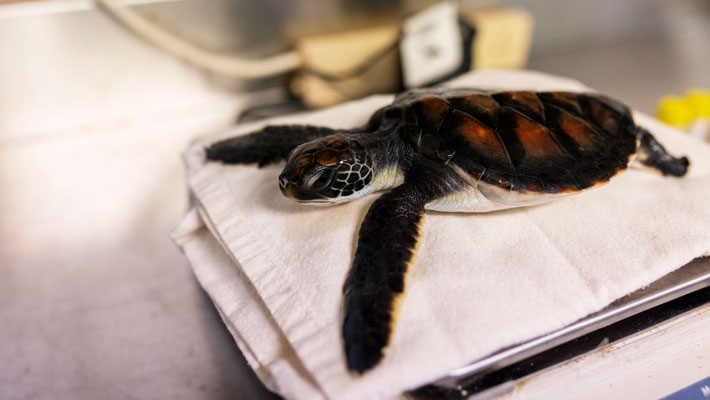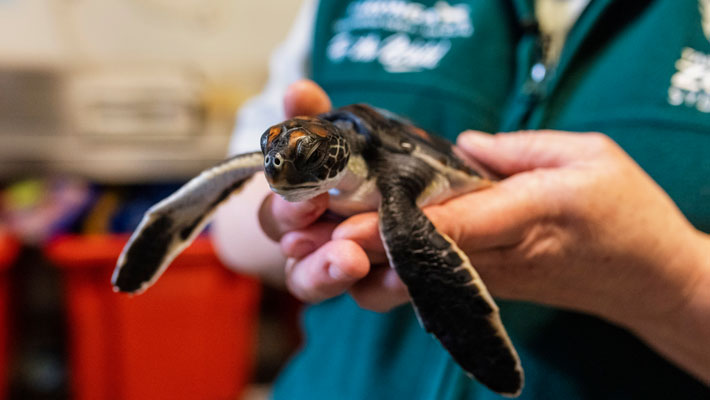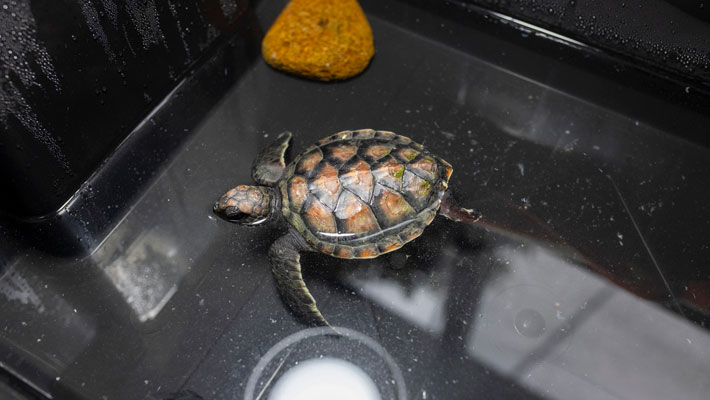Posted on 04th August 2022 by Media Relations
RESCUED TURTLE HATCHLING POOED PLASTIC FOR SIX DAYS
A green sea turtle hatchling weighing just 127g was found at Tamarama Beach in Bondi recently and brought to Intensive Care at Sydney’s Taronga Wildlife Hospital. The hatchling, who had a stomach full of plastic on admission, is a powerful reminder in Plastic Free July of the impact marine debris can have on our wildlife.
“The turtle was found lying on its back in a rockpool,” says Taronga veterinary nurse, Sarah Male. “It’s back right flipper was missing, and its back left flipper had a little chip out of it. A small piece of its shell was also missing – indicating something had taken a bite out of it.”
Upon arrival at Taronga Wildlife Hospital, the turtle received a full health assessment. The veterinary team noted that despite its missing flipper, the turtle was able to swim well. The real threat to its health was something else entirely.
“The turtle was in good physical condition when it arrived, apart from its missing flipper and some dried blood on his shell,” Sarah says. “But then it started to defecate, and it defecated plastic for six days. No faeces came out, just pure plastic.”



Each morning, a UV lamp is switched on above the turtle’s tank. This light source helps the turtle to grow and encourages its shell – made of keratin – to harden. Sarah also uses a baby thermometer to check the water temperature, ensuring it is around 24 degrees. She then gives the tank a clean and offers the turtle its morning meal – a special gel made at the hospital that contains vitamins and minerals. Its afternoon meal is frozen fish containing oils and fat to help the turtle bulk-up.
“Turtles are my favourite animals to look after,” Sarah says. “It’s great to watch them grow and they are such an intricate animal requiring specialised care. I would say this little one was lucky… Some of the plastic that came out was sharp and could have caused an obstruction, but it excreted it all.”
It can take up to 40 years for a female green turtle to reach sexual maturity and it’s estimated that as few as 1 in 1000 hatchlings will reach adulthood. Classified as endangered, green sea turtles face various threats in the wild, including the intentional harvesting of eggs and adults from nesting beaches and habitat degradation. They are also at risk from marine debris.
Taronga Wildlife Hospital cares for up to 80 marine turtles every year, many of which are admitted with severe injuries caused by entanglement in fishing lines and crab pots, as well as hook and plastic ingestion.
Plastic has a devasting impact on our marine environment. “Experts estimate that 33 per cent of marine turtles and 43 per cent of seabirds have ingested plastic in their lifetimes,” says Belinda Fairbrother, Taronga’s Manager of Guest Learning and Community Impact. “It’s also predicted that by 2050, the total weight of plastics in our oceans will outweigh that of fish.”
The New South Wales Government is rolling out its Plastics Action Plan to help combat this issue. As of 1 June, all lightweight single-use bags were banned in NSW. From November, other single-use plastic items are being banned, including plastic straws, stirrers, cutlery, plates, bowls and cotton buds.
Minister for Environment James Griffin said about 95 per cent of the plastic on our beaches travels there through storm water systems from streets and parks. “Our single-use plastic bans coming into force this year are focussed on the things that we most often find littered, to help stop them from entering the land and marine environment in the first place,” Mr Griffin said.
“Single-use plastic items and packaging make up 60 per cent of all litter in NSW, and our bans will prevent almost 2.7 billion items of plastic litter from entering the environment over the next 20 years,” Mr Griffin adds.
“All of us can make a huge difference to our plastic pollution problem – and to our precious marine life like this turtle hatchling at our Wildlife Hospital – simply by finding reusable alternatives to almost every disposable item, including reusable coffee cups, bottles, straws and containers,” Taronga’s Belinda Fairbrother says.
Taronga’s two Wildlife Hospitals provide vital emergency assistance to all kinds of sick and injured native animals. With your help we can provide them with the best possible care - Donate today